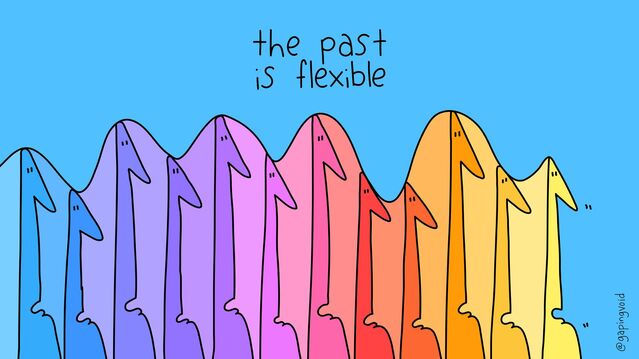Memory
The Past Isn't Objective: Your "Story" Is Your Responsibility
How memory and "meaning" work.
Posted June 17, 2020 Reviewed by Gary Drevitch
"Because sometimes the past deserves a second chance." —Malcolm Gladwell
A common scientific premise is known as “causal determinism”—the idea that everything that happens or exists is caused by prior conditions or events. From this view, people are determined—not influenced—by prior events, like one domino in a toppling chain.
This viewpoint is popular and can lead to the justification of poor behavior and lack of progress, but it is actually the opposite of what is really happening. Your past isn't the thing "causing" you to be who you are. Actually, who you are right now, and how you see the world right now, is determining the meaning of the past.
We can see this on a societal level. When events occur, such as recent police brutality and widespread awareness, our views of the past change. Things we once thought were okay are no longer tolerable.
History is constantly changing in light of new data, new experiences, and new perspectives. Individually, our memory works the same way. The past, and how we view it, is more a reflection of where we currently are than of the past itself. As psychologist Brent Slife states in Time and Psychological Explanation (italics mine):
"We reinterpret or reconstruct our memory in light of what our mental set is in the present. In this sense, it is more accurate to say the present causes the meaning of the past, than it is to say that the past causes the meaning of the present. . . . Our memories are not “stored” and “objective” entities but living parts of ourselves in the present. This is the reason our present moods and future goals so affect our memories."

Your "Past" Is Your Responsibility
"The stories of our lives, far from being fixed narratives, are under constant revision." —Gordon Livingston, MD
According to the theory of “narrative identity” developed by scholar and researcher Dr. Dan McAdams, we all form our identity by integrating our life experiences into an internalized evolving story. The story gives a sense of unity and purpose in our lives.
Our "story" is constantly changing in light of new experiences and insights. We reinterpret our past based on where we are in the present. Our "identity," which is how we see and explain ourselves, is based on the story we tell about ourselves and our lives. Interestingly, despite the fact that people grow and change over time, there are certain experiences that seem to stick with us. We could call these "trauma" or even "core memories."
A crucial aspect of "trauma"—which is any negative event that shapes how you view yourself—is that such "memories" are often dissociated with the rest of your narrative. In other words, when you have new experiences, you usually integrate those new experiences into the tapestry of your ever-evolving memory and worldview. But with certain experiences, you separate those experiences from the rest of your life, and as a result, those memories or "stories" don't evolve as you evolve.
As a result, aspects of your identity or "story" don't change, sometimes for years. In other words, you continue to be "defined" by past experiences that no longer reflect the person you are today or the life you're currently living.
However you see an experience from the past or present, it's crucial to realize that your perspective in not objective. Your perspective is the meaning you give to your experience, usually based on how you felt during that experience. Your identity and "story" are based on the meanings you give to your life and experiences.
Becoming more emotionally developed as a person means you face the past, which involves a great deal of courage. Rather than avoiding the past, you become curious about it. You become emotionally flexible. You become open to new ideas and perspectives. You proactively seek to change your own narrative, knowing that if you don't, you'll be limited in the future.
You can change the story of your past. You can change the meanings. You can change your memory and when you do, you'll be able to learn more from future experiences. Your past is not objective. Your story and your view of the past is your responsibility. Of this, psychiatrist Gordon Livingston said:
“Each of us have similar latitude in how we interpret our own histories. We have the power to idealize or denigrate those characters that inhabit our life stories. We just need to experience both alternatives as reflections of our current need to see ourselves in certain ways, and to realize that we are all able color our past either happy or sad.”
This post is an excerpt from Benjamin Hardy's book, Personality Isn't Permanent, published by Penguin Random House.
References
Livingston, G. (2009). Too soon old, too late smart: Thirty true things you need to know now. Da Capo Lifelong Books.
McAdams, D. P., & McLean, K. C. (2013). Narrative identity. Current directions in psychological science, 22(3), 233-238.
Slife, B. D. (1993). Time and psychological explanation. SUNY press.




